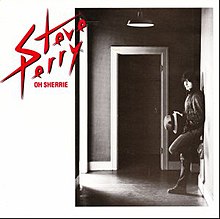| "Oh Sherrie" | ||||
|---|---|---|---|---|
 | ||||
| Single by Steve Perry | ||||
| from the album Street Talk | ||||
| B-side | "Don't Tell Me Why You're Leaving" | |||
| Released | March 1984 (US)[1] | |||
| Recorded | 1983 | |||
| Studio | Record One, Los Angeles | |||
| Genre | ||||
| Length | 3:48 | |||
| Label | Columbia | |||
| Songwriter(s) |
| |||
| Producer(s) |
| |||
| Steve Perry singles chronology | ||||
| ||||
| Music video | ||||
| "Oh Sherrie" on YouTube | ||||
"Oh Sherrie" is the debut solo single by American singer Steve Perry. Written by Perry, Randy Goodrum, Craig Krampf and Bill Cuomo, the song was recorded and released on Perry's first solo album Street Talk in 1984, which he released while still a member of Journey. The song is often regarded as an "honorary" Journey song, being credited to the band on several hit compilation albums and in other media, largely due to its resemblance to the band's trademark sound, as well as their performances of the song on the Raised on Radio Tour, which proved to be Perry's live swansong with the band.[3] The track is composed in the key of F major with a time signature of 4
4, following a tempo of 120 beats per minute.[4]
The song was Perry's biggest hit as a solo artist and written for his then-girlfriend Sherrie Swafford,[5] who also appeared in the music video. The song hit number three on the pop chart and number one on the rock chart in the United States,[6] partly aided in its success by a music video released to promote the song, which received heavy airplay on MTV.
Two of the song's co-writers and supporting musicians, Bill Cuomo and Craig Krampf, earlier performed on Kim Carnes' signature song "Bette Davis Eyes" in 1981. Cuomo, who performed the keyboard riff on "Oh Sherrie," was the musician responsible for the keyboard riff on "Bette Davis Eyes", and Krampf was the drummer on "Bette Davis Eyes" while Larrie Londin was the drummer for "Oh Sherrie".[7] Cuomo, Krampf and Perry had started composing the song at approximately midnight with little more than the simple chorus of "Oh Sherrie" and "Hold on, hold on" plus a few simple sounds. Swafford had been in the room with them initially, but had gone to sleep because of the late hour.[5]
- ^ Strong, Martin Charles (1995). The Great Rock Discography. Canongate Press. p. 445. ISBN 9780862415419.
- ^ Rolling Stone Staff (September 17, 2014). "100 Best Singles of 1984: Pop's Greatest Year". Rolling Stone. Retrieved August 27, 2023.
...the lead single from [Street Talk]...bore many of his band's signature touches — pealing guitars, urgently pled verses and a sense of arena-rock pomp.
- ^ "Solo Hits Credited to the Band Anyway...". New Book of Rock Lists. Sidgwick & Jackson. 1994.
- ^ Oh Sherrie
- ^ a b Steve Perry talks about the recording of "Oh Sherrie" and Street Talk singles.
- ^ Whitburn, Joel (2004). The Billboard Book of Top 40 Hits, 8th Edition (Billboard Publications), page 487.
- ^ Blair Jackson (2003). "Classic Tracks: Kim Carnes' "Bette Davis Eyes"". Mix. Archived from the original on 2014-07-13. Retrieved 2010-04-10.